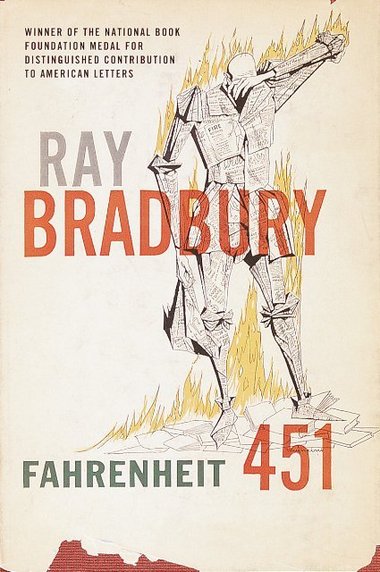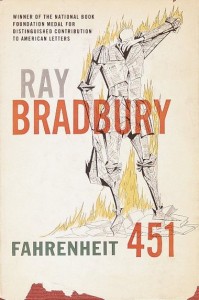
Book report: Ray Bradbury — Fahrenheit 451
 There are countless so-called classics of literature that simply can’t live up to their reputation, and yet they find their way into the curricula of high school and college literature courses year after year. I’ve read many of them since graduating and found some to be pretty good (Adventures of Huckleberry Finn) and others pretty bad (The Catcher in the Rye). Ray Bradbury’s Farenheit 451, however, is deserving of all the praise it receives.
There are countless so-called classics of literature that simply can’t live up to their reputation, and yet they find their way into the curricula of high school and college literature courses year after year. I’ve read many of them since graduating and found some to be pretty good (Adventures of Huckleberry Finn) and others pretty bad (The Catcher in the Rye). Ray Bradbury’s Farenheit 451, however, is deserving of all the praise it receives.
What struck me most about the book, aside from Bradbury’s top-notch writing and storytelling skill, was that the oft-cited theme of censorship was almost secondary in the plot. I was prepared to read a novel warning about the insidiousness of censoring books, but instead was treated to an eerily prescient look at a slothful and intellectually stunted society that valued immediate and shallow sensory gratification at the total exclusion of free thinking and analysis. In short, a society where television that was more real than before and music that was piped into people’s ears with little buds had made the written word obsolete at first and eventually dangerous. Sound familiar?
In my mind, what makes any kind of art great is the ability to not just move people at the time it’s created, but to speak to future generations as well. Many of the books, movies, and TV shows considered to be “classics” are really nothing more than historical curiosities; snapshots of an old way of life or an old culture that have little relevance anymore. But the real classics (with ironic quotes removed) find and expose essential truths about humans and our world, and never lose their impact.
That’s why the universal themes of William Shakespeare live almost four centuries after his death. And it’s why I think Farenheit 451, although just over half a century old, can rightly be called a classic. The story of Guy Montag is the story of any person who has awoken from their walking slumber and started to question the world around them. And there is certainly no shortage of firemen like Captain Beatty out there; people who ought to know better than to accept the suppression of thought and expression (be it in the form of books, music, sculpture, etc.), but who either allow it to happen or take an active role.
Saddest of all, there is certainly no shortage of people like Guy’s wife Millie, who are not even aware enough to care one way or another.
People found this post by searching for:
- "the man in the gray flannel suit sparknotes", "the man in the gray flannel suit analysis", "man in the gray flannel suit sparknotes", "the man in the grey flannel suit sparknotes", "the man in the gray flannel suit book quotes"
Chris
I will definitely add it to the list, but it may have to wait a bit. Between F451 and the Vietnam book I just wrapped up, I think I need to lighten it up a bit for the next entry.